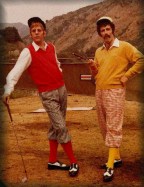
Build Date: Thu Feb 19 20:40:17 2026 UTC
Can't we just admit we're ALL fuckheads with astoundingly stupid opinions from time to time?
-- Tjames Madison
Upstart American Spirits Puts Ancient Wisdom in Every Pack
Reported 1999-06-20 14:27 by Mr. Bad
| It's not often that in the hardscrabble tobacco industry a new kid on the block can make a dent in the market share of the Giants of Smoking like RJR and Philip Morris. And yet, that's exactly what scrappy upstart American Spirit has done, gaining 15% share in the all-important 18-24 target demographic in the 5 years since they entered the fray. | |
| How do they do it, you ask? The New Mexico-based corporation has a secret weapon up its sleeve: the traditional cigarette-making wisdom of an ancient and noble people. | |
| American Spirits cigarettes are the collective pride of the citizens of the Waiala Pueblo Tribe, located 150 mi. northeast of Santa Fe. The Waiala have created tobacco products by hand since time immemorial. | |
| "Our elders say that the first cigarette was created by our Father the Sun after begetting all the things of the earth by our Mother the Moon," Waiala leader Sam Tchakaiolo informed Pigdog Journal during a recent visit to the Great Southwest. "We celebrate the post-coital glow of the All-Father each time we make a relaxing American Spirit cigarette." | |
| Tchakaiolo, the wiry, sun-wrinkled 54-year-old kapa or "cigarette big man" of the Waiala, led us on a tour of the scenic Waiala Pueblo where American Spirits are made. PJ was surprised to see that cigarette production on a massive scale goes on side-by-side with traditional tribal living. | |
| "This is our way of life," the kapa explained. "Sooner ask us to stop eating coyote-gut stew, to stop selling firecrackers and anatomically-correct novelty statuettes by the roadside, than to stop producing 50,000 gross of regular, light, wide and menthol cigarettes per day." | |
| American Spirits begin in the terraced tobacco fields of Waiala Pueblo, hand-carved into the 4000-foot high walls of the Waiala Mesa. The back-breaking labor of tending the fields is performed by the married women of their tribe, who can often be seen bent in a permanent agonizing stoop over the green, leafy tobacco rows, and occasionally falling to their deaths on the canyon floor below. | |
| No chemical pesticides or fertilizers are used on the plants. "We fertilize them with corn husks, fish skeletons and human dung," says Tchakaiolo. "This gives American Spirit cigarettes their unique 'close-to-nature' flavor." | |
| Once the tobacco is harvested, dried, and chopped, it's on to the rolling kiva. It's here that we find the traditional rolling paper, made from mesquite wood chewed for hours by the tribe's virgins, stamped flat by foot and dried in the life-draining desert sun. Also on hand are filters made of finest lambs' wool, sheered from the nether regions of the newborn females on the night of the first full moon in the Spring. | |
| Rolling the cigarettes themselves, though, is the province of the tribe's warriors. | |
| "The men of the tribe prepare for hours in the kiva, or religious trailers, of our reservation," explains Ivan Kachumoro, the garana or "rolling big man" of the Waiala. "We fry on all kinds of crazy-ass desert plants for, like, _days_. You ever try to roll 100,000 cigarettes? You'd wanna be heap big fucked up, too." | |
| Once spiritually and physically prepared for the task of rolling, the men sit in the circular rolling kiva and begin their task. Taking a filter and a handful of tobacco between the fingers of his right hand, the warrior tears off a square of paper in his left, and with a flick of his wrist, a perfect cigarette is made. This is repeated thousands upon thousands of times per day. | |
| Finally, the finishing touches are put on the cigarette itself. A thin gold band is painted around the filter end of the butt. "We had some problem coming up with all that gold," admits Tchakaiolo, "We made a deal with the Mexican government to use the melted-down remains of Aztec ceremonial masks. Turns out there's international indigenous peoples' agreements out there that allow us to desecrate priceless works of all humanity for our own gain. Who'd a thunk it?" | |
| As cigarettes are made, they are gathered into packs of twenty (a holy number to the Waiala) in the hands of small, dirty children who run them over to the Packing Pueblo. Here, the eldest, wisest women in this matriarchal society put the cigarettes in their final packages and seal the closure with a brief chant and wave of a smudge stick. | |
| The packages themselves are made by hand by in Waiala Pueblo. Tin ore for the foil is mined on ancestral lands 200 miles away and carried by llama back to the Pueblo, where it is smelted over dense, hot buffalo-dung fires. | |
| The cellophane wrapper is harvested from the plentiful ana'i, or cellophanus cactus -- it's peeled like sunburnt skin off the plant's outer husk. Finally, the paper shell of the package is lovingly hand-painted by a skilled artisan after much prayer and fasting. | |
| But what about the logo on the American Spirits package, a silhouette of what is obviously a Plains Indian smoking a peace-pipe, not a cigarette? | |
| "Well," Tchaikaolo says, "our most revered elder was visited in a dream by Kahi'iki Pa'ona, the Kachina of Marketing. He was told that having a picture of one of us Southwest Indians with our traditional Moe the Stooge haircut just wasn't gonna get us anywhere. So we use the Chief, there, instead." | |
| Yet more proof that modern wisdom, matched with ancient ways, makes for good business! |
T O P S T O R I E S
The Crossroads are real and The Blues is a place; The enduring myth of Robert Johnson (More...)
California Glory Hole attracts huge crowds
A glory hole at Napa's Lake Berryessa is drawing huge crowds. According to Chris Lee, the general manager for the Solano County Water Agency, the glory hole hasn't been active since 2019, and only restarted operations on Feb 4. (More...)
Republican State Senator busted after soliciting a teenage girl
Republican State Senator Justin Eichorn of Minnesota was arrested for soliciting a teen girl on Monday just hours after he introduced a bill proposing "Trump derangement syndrome" (TDS) as a form of mental illness. (More...)
Parents claim measles is not that bad after having only one child die
The parents of a Texas girl who died from the measles are defending their decision not to vaccinate their daughter. "She says they would still say 'Don't do the shots,'" an unidentified translator for the parents said. "They think it’s not as bad as the media is making it out to be." (More...)
Delusional rich man tries to fire town staff
"I'm mayor now" said write-in mayoral candidate and founder of Pirate’s Booty Snacks Robert Ehrlich after losing the election for Mayor of Sea Cliff, NY. Then he tried to take over the Village Hall and fire everyone. (More...)
Musk claims Xitter security is staffed by idiots
Earlier this month Xitter experienced a massive outage. In an interview, Musk told Fox Business that he believes the attack came from "IP addresses originating in the Ukraine area." (More...)
C L A S S I C P I G D O G
Songs Of Love And Special Things
Well, dear reader, there's no denying it: Spring has sprung. The air is pungent with the fertile aroma of Romance. And you know what goes with Romance, don't you? That's right, Lover, porn. And not just any porn, but the kind you can sing along to. (More...)
The Ancient and Correct Sake Ceremony
Many Americans have learned to appreciate the delicate, sophisticated flavors of Japanese food and drink, along with the beautifully refined rituals of Japanese dining. San Francisco, as a gateway between East and West, has especially benefited from the flowering of Eastern consciousness in America. It is hardly possible to walk down the street without stepping on somebody's sushi. (More...)
40 Acres, a Mule, and a Crummy 90-Second Spot on Weekend Update
Consider the plight of the Black Man. The Black Man on "Saturday Night Live," I mean. Has there ever been a more pathetic thing than a token unredeemed for 28 years? Where is the NAACP when you really need them? (More...)
Place the Lighter on the Ground and Let Us See Your Hands
So I have been thinking on this whole flag burning issue and all the things it could imply. Now a lot of people right now are saying that there are more important issues at stake and something so trivial is a waste of time. Believing such is really losing sight of some very key changes happening in our nation right now. Being a strict conservative, and currently serving in Iraq, I was surprised to find that I am actually appalled that the House approved a ban on flag burning. (More...)
Johnnie Royale's Guide to Wakes
Wakes can present problems for Bad People of the Future. (If you don't know what a BPotF is, you need to read more of the PDJ.) Sure, your friend is gone and you miss him and that really sucks; it does, I know. But all Bad People of the Future are gonna die, and they have all accepted that fact. They do deserve, however, to have one final kickass party to celebrate all the bad things they've done in the past, present and future. And you, as a friend, have to make sure that their desire for a final send off is well executed (sorry for the pun). That's just the way of BPotFdom. (More...)
Experimenter is a film released in 2015 starring Peter Sarsgaard. It tells the story of Dr. Stanley Milgram's life, including the infamous Milgram electric shock experiment, tests on crowds, and his work developing a theory on the mechanics of social networks. It currently streams on Netflix. (More...)



